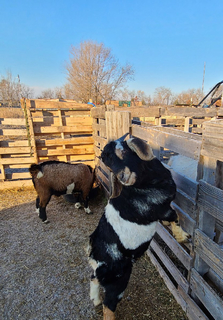Key takeaways
- Relationships matter.
- Halal is built on trusting relationships, and it takes time to build trust between halal customers, retailers, and goat producers.
- Tiffany, the owner of Kandi Acres, spent significant time not only arranging sales with store owners but also getting to know them as people, which took additional time as she connected with people from different cultures and who spoke different native languages.
- To sell to halal customers, entrepreneurs may need to minimize their approach to sales as “all business” and be very transparent about how the animal was raised and processed.
- Processing is key to success.
- Processing impacts the success of marketing halal meat due to its effect on price and logistics. For relatively small animals like goats, the cost of processing is a significant part of the end product’s price per pound.
- Due to the needs of halal slaughter, such as having a Muslim slaughterman, the logistics of processing animals consistently and in a timely manner can be a challenge.
- Having a good processor that meets the necessary requirements of halal will move the process from stressful and difficult to easy and consistent.
- Price and marketing costs drive outlet success.
- Kandi Acres realized a better return to their goats when they direct marketed to stores rather than trucking their animals to an auction far away. This was due to a decrease in marketing costs, such as time and transport to and from the auction, as well as a steady price per live weight for bigger animals.
- At the auction, prices fluctuate, and as of this writing, they have been significantly higher than when Kandi Acres set out to market on its own.
- Operators would benefit from examining each available outlet by the total cost in time and travel per load and comparing it to the alternatives. For some, it may make financial sense to enter the growing market for halal meat.
About the case study
Halal meat is a growing opportunity for livestock producers in Minnesota. According to the Halal and Kosher Meat Market Assessment, Minnesota is home to 150,000 Muslims, 91 halal grocery stores, and a $20 million halal goat meat market.
Nearly all halal goat meat in Minnesota, however, comes frozen from Australia or New Zealand. With few Minnesota livestock producers engaging in the halal meat market, an opportunity exists to raise and sell locally raised halal meats to this growing customer base.
The purpose of this case study is to share one livestock farm’s experience entering the halal market so others can learn from it. In this example, Kandi Acres marketed halal meat direct to halal stores between October 2021 and July 2022. As a pilot project supported by Southwest Regional Sustainable Development Partnership and Mid-Minnesota Regional Development Commission, multiple parties were involved, including three halal grocery stores, a new state "equal to" meat processor and halal certifier, and the livestock farm.
This case study illuminates the relationships, challenges, and insight gained as all parties worked together to build a supply chain beneficial to the farmers, processors, retailers and consumers.
Reviewed in 2022


